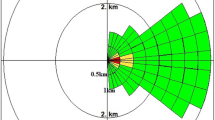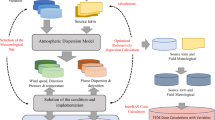Abstract
In a radiological event, the lack of preliminary information about the site of explosion and the difficulty in predicting the accurate path and distribution of radioactive plumes makes it difficult to predict expected health effects of exposed individuals. So far, in such a health evaluation, radiation-induced stochastic health effects such as cancer are not included. The Pasquill–Gifford atmospheric classes generally allow connecting atmospheric stability with dispersion of radioactive contaminants to the environment. In this work, an environmental release of radioactive Cs-137 was simulated and the resulting relative risk for solid cancer incidence among the affected population calculated. The HotSpot health physics code was used to simulate the radioactive atmospheric dispersion and calculate the Total Effective Dose Equivalent (TEDE), which was then used to estimate the relative risk of cancer incidence. The main results from this work suggest that the relative cancer risk and atmospheric stability classes are linked by differences in the TEDE. Such a finding may support triage, because it adds additional information on the potentially affected population at the early stages of an emergency response.


Similar content being viewed by others
References
Andrade CP, Souza CJ, Camerini ES, Alves IS, Vital HC, Healy MJ, Ramos De Andrade E (2018) Support to triage and public risk perception considering long-term response to a Cs-137 radiological dispersive device scenario. Toxicol Ind Health. https://doi.org/10.1177/0748233718762920
EPA (2016) PAG manual—protective action guides and planning guidance for radiological incidents. US Environmental Protection Agency, Washington, p 20460
Grant EJ et al (2017) Solid cancer incidence among the life span study of atomic bomb survivors: 1958–2009. Radiat Res 187:513–537. https://doi.org/10.1667/RR14492.1
Homann SG (2013) HotSpot health physics codes version 3.0 user's guide. Lawrence Livermore National Laboratory, Livermore
Hunter C (2012) A recommended Pasquill–Gifford stability classification method for safety basis atmospheric dispersion modeling at SRS. Department of Energy United States of America, Washington. https://doi.org/10.2172/1037732
IAEA (1996) IAEA-TECDOC-870—Methods for estimating the probability of cancer from occupational radiation exposure. International Atomic Energy Agency, Vienna
IAEA (2005) Categorization of radioactive sources. International Atomic Energy Agency, Vienna
ICRP (2007) The 2007 recommendations of the international commission on radiological protection. ICRP publication 103. Ann ICRP 37:1–332. https://doi.org/10.1016/j.icrp.2007.10.003
Jeong H, Park M, Hwang W, Kim E, Han M (2013) Radiological risk assessment caused by RDD terrorism in an urban area. Appl Radiat Isot 79:1–4. https://doi.org/10.1016/j.apradiso.2013.04.018
Kamboj S, Cheng JJ, Yu C, Domotor S, Wallo A (2009) Modeling of the EMRAS urban working group hypothetical scenario using the RESRAD-RDD methodology. J Environ Radioact 100:1012–1018. https://doi.org/10.1016/j.jenvrad.2009.03.018
Mettler FA (2012) Medical effects and risks of exposure to ionising radiation. J Radiol Prot 32:N9–N13. https://doi.org/10.1088/0952-4746/32/1/N9
Nishiyama H, Saenger EL, Grossman LW, Lukes SJ (1985) Accidental Cs-137 contamination. Radiology 154:513–517. https://doi.org/10.1148/radiology.154.2.3917572
Pasquill F (1961) The estimation of the dispersion of windborne material. Meterol Mag 90:33–491
Preston DL et al (2007) Solid cancer incidence in atomic bomb survivors: 1958–1998. Radiat Res 168:1–64. https://doi.org/10.1667/RR0763.1
Rother FC, Rebello WF, Healy MJ, Silva MM, Cabral PA, Vital HC, Andrade ER (2016) Radiological risk assessment by convergence methodology model in RDD. Scenar Risk Anal 36:2039–2046. https://doi.org/10.1111/risa.12557
Shin H, Kim J (2009) Development of realistic RDD scenarios and their radiological consequence analyses. Appl Radiat Isot 67:1516–1520. https://doi.org/10.1016/j.apradiso.2009.02.054
Taylor VF, Evans RD, Cornett RJ (2008) Preliminary evaluation of (135)Cs/(137)Cs as a forensic tool for identifying source of radioactive contamination. J Environ Radioact 99:109–118. https://doi.org/10.1016/j.jenvrad.2007.07.006
Turner DB (1994) Workbook of atmospheric dispersion estimates: an introduction to dispersion modeling, 2nd edn. Boca Raton, CRC Press
Acknowledgements
The authors wish to thank the colleagues who contributed with many useful comments and suggestions, in particular Mr. Ricardo M. Stenders. This work was supported by the Brazilian National Council for Scientific and Technological Development (CNPq Grant N° 409622/2016-8).
Author information
Authors and Affiliations
Corresponding author
Ethics declarations
Conflict of interest
No potential conflict of interest was reported by the authors.
Additional information
Publisher's Note
Springer Nature remains neutral with regard to jurisdictional claims in published maps and institutional affiliations.
Rights and permissions
About this article
Cite this article
Bulhosa, V.M., Funcke, R.P.N., Brum, T. et al. Solid cancer risk dependence on the Pasquill–Gifford atmospheric stability classes in a radiological event. Radiat Environ Biophys 59, 337–342 (2020). https://doi.org/10.1007/s00411-020-00840-3
Received:
Accepted:
Published:
Issue Date:
DOI: https://doi.org/10.1007/s00411-020-00840-3




